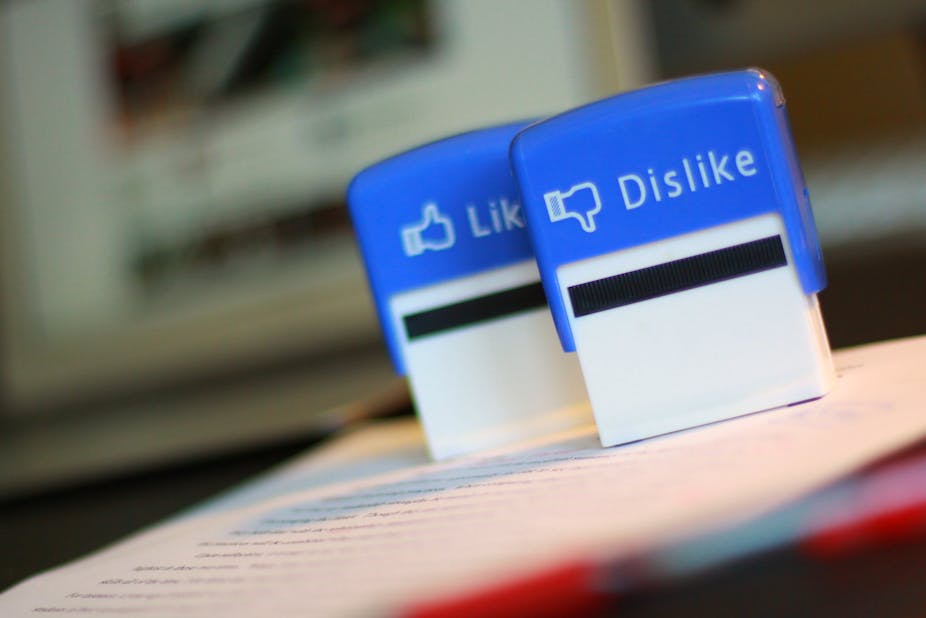What does 2014 hold for your online life? If you’re young, it probably won’t involve Facebook that much.
This year marked the start of what looks likely to be a sustained decline of what had been the most pervasive of all social networking sites. Young people are turning away in their droves and adopting other social networks instead, while the worst people of all, their parents, continue to use the service.
As part of a European Union-funded study on social media, we are running nine simultaneous 15-month ethnographic studies in eight countries. What we’ve learned from working with 16-18 year olds in the UK is that Facebook is not just on the slide, it is basically dead and buried. Mostly they feel embarrassed even to be associated with it. Where once parents worried about their children joining Facebook, the children now say it is their family that insists they stay there to post about their lives. Parents have worked out how to use the site and see it as a way for the family to remain connected. In response, the young are moving on to cooler things.
Instead, four new contenders for the crown have emerged: Twitter, Instagram, Snapchat and WhatsApp. This teaches us a number of important lessons about winning the app war.
Slick isn’t always best
It’s worth noting that the sites and apps that have stolen the hearts of Facebook exiles are no match for it in terms of functionality. Most of the school children in our survey recognised that in many ways, Facebook is technically better than Twitter or Instagram. It is more integrated, better for photo albums, organising parties and more effective for observing people’s relationships.
None of these four have the range of integrated functions found on Facebook. WhatsApp is better for messaging and is now said to have overtaken Facebook as the number one way to send mobile messages. But it doesn’t begin to compare as an overall social network site. Neither can the others. This suggests that the dynamics of new media may depend on factors other than function.
Who’s watching you? Who cares?
Many in journalism and elsewhere wanted Facebook to fall. As Facebook became a behemoth, it started to be seen by some as an evil data corporation that represented global neo-liberal capitalism. The company has long been accused of hoovering up your user data and giving advertisers access to it. This year, concern over this type of activity reached an all time high, when it became clear that the NSA was accessing Facebook information. But young people havn’t gone to the expected alternatives. A lot of them have turned to Snapchat, a picture-sharing service that allows you to send pictures that disappear seconds after they have been sent.
While users are migrating from Facebook, they don’t appear to be doing it to make a statement about mass surveillance or big corporations. One of the most popular alternatives is Instagram, a site which allows you to upload and share photos. And who owns this site? Facebook, of course. Among our UK subjects, there was no evidence that these issues affected their choice of social networking service.
My mum wants to friend me
What appears to be the most seminal moment in a young person’s decision to leave Facebook was surely that dreaded day your mum sends you a friend request. You just can’t be young and free if you know your parents can access your every indiscretion. The desire for the new, also drives each new generation to find their own media and this is playing out now in social media. It is nothing new that young people care about style and status in relation to their peers, and Facebook is simply not cool anymore.
For anthropologists each media is best defined in relation to the others, what we call polymedia. So Facebook may look the same in 2014, but it has changed by virtue of this new competition. In my school research, the closest friends are connected to each other via Snapchat, WhatsApp is used to communicate with quite close friends and Twitter the wider friends. Instagram can include strangers and is used a little differently.
Facebook, on the other hand, has become the link with older family, or even older siblings who have gone to university. To prevent overgrazing as others beasts have occupied its terrain, Facebook has to feed off somewhere else. It has thereby evolved into a very different animal.

